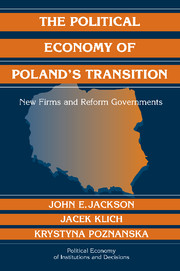Book contents
- Frontmatter
- Contents
- List of Tables
- List of Figures
- Acknowledgments
- List of Abbreviations
- 1 Why Poland?
- 2 The Dynamics of the Polish Political Economy, 1990–1997
- 3 Creative Destruction and Economic Transition
- 4 The Social and Distributional Costs of Transition
- 5 Individual Attitudes and Voting
- 6 De Novo Job Creation and Election Returns
- 7 Liberal Economic Interests and Seat Allocations
- 8 The Political Economy after 1997
- 9 The Political Economy of Transition: Why Poland?
- Appendix A Assessing Measures of New and Small Firms in Poland
- References
- Index
- Titles in the series
3 - Creative Destruction and Economic Transition
Published online by Cambridge University Press: 07 August 2009
- Frontmatter
- Contents
- List of Tables
- List of Figures
- Acknowledgments
- List of Abbreviations
- 1 Why Poland?
- 2 The Dynamics of the Polish Political Economy, 1990–1997
- 3 Creative Destruction and Economic Transition
- 4 The Social and Distributional Costs of Transition
- 5 Individual Attitudes and Voting
- 6 De Novo Job Creation and Election Returns
- 7 Liberal Economic Interests and Seat Allocations
- 8 The Political Economy after 1997
- 9 The Political Economy of Transition: Why Poland?
- Appendix A Assessing Measures of New and Small Firms in Poland
- References
- Index
- Titles in the series
Summary
This chapter develops and analyzes statistically a model of economic development that is consistent with the description of the changes in the Polish economy presented in the previous chapter. This model draws heavily on the arguments of Joseph Schumpeter ([1911] 1934) and later works of organizational theorists in sociology and economists in industrial organizations. Schumpeter's proposition is that economic growth is the “new combination” of materials and processes to create new products, production methods, markets, raw materials, or organizations: he also says these “new combinations are, as a rule, embodied, as it were, in new firms which generally do not arise out of the old ones but start producing beside them” (Schumpeter, 1934, pp. 65–66). The emphasis is on new firm creation, survival, and growth as a means for transforming and expanding economic activity rather than on the transformation and growth of existing enterprises. In fact, the new economic organizations displace and replace the older, outmoded ones – what Schumpeter and others refer to as creative destruction. The key variables of birth, survival, and growth of new firms constitute the entrepreneurial process.
MODELING NEW-FIRM CREATION, SURVIVAL, AND GROWTH
In our simple model of economic evolution, there are three central variables: the creation of new firms, the survival rates of these firms, and the growth rates of the surviving firms. This emphasis on these variables as a means for transforming and expanding economic activity is the focus of work in organizational ecology.
- Type
- Chapter
- Information
- The Political Economy of Poland's TransitionNew Firms and Reform Governments, pp. 51 - 97Publisher: Cambridge University PressPrint publication year: 2005



